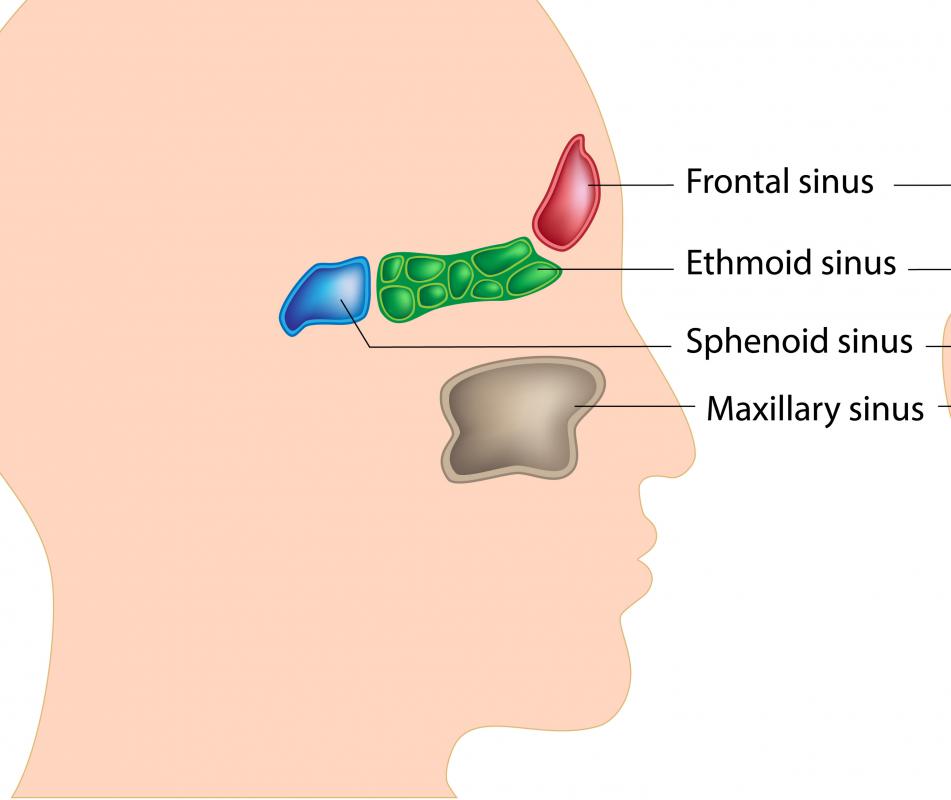At WiseGEEK, we're committed to delivering accurate, trustworthy information. Our expert-authored content is rigorously fact-checked and sourced from credible authorities. Discover how we uphold the highest standards in providing you with reliable knowledge.
What are the Symptoms of Sinusitis?
Sinusitis is a condition in which the paranasal sinuses become irritated and inflamed due to an infection, allergy, or structural defect. Mucus is unable to drain properly from swollen sinus cavities, leading to a number of uncomfortable symptoms. Common symptoms of sinusitis include nasal congestion, coughing, pressure in the cheekbones, and headaches. A person may experience an acute bout of sinusitis, in which symptoms last for about one week, or chronic problems that can recur frequently or last more than eight weeks at a time. Doctors typically can evaluate the symptoms of sinusitis and determine the best treatment for acute and chronic issues.
Instances of acute and chronic sinusitis are usually caused by bacterial, viral, or fungal infections. A person who contracts a cold or the influenza virus is likely to experience lingering sinus issues for several days after other symptoms have disappeared. Allergies to dust, smoke, and pollen can also cause chronic sinusitis, as can a direct injury or a congenital condition that affects the structure of bones in the face.

The most prominent symptoms of sinusitis in both acute and chronic cases are nasal congestion and drainage of thick mucus from the nostrils. Mucus can also drip down into the throat, leading to coughing and throat irritation. Congestion results in pressure buildup in one or more of the sinus cavities, including the frontal sinuses in the forehead, the maxillary sinuses in the cheeks, and the ethmoid and sphenoid sinuses around the eyes. A person may notice that his or her face is tender to the touch in areas where pressure is the worst.

Other symptoms of sinusitis include bad breath, lessened ability to taste and smell, ear pain, and fatigue. Some people become nauseous and experience mild headaches due to constant sinus pressure. Pain and headaches tend to worsen when an individual leans forward or stands up quickly. Fever may be present in acute cases, and toothaches and jaw pain can result from pressure in the maxillary sinuses.

A person can usually treat mild symptoms of sinusitis at home. Over-the-counter flu or cold medicines can break up mucus in the sinuses and promote proper drainage. Taking pain medication and applying a damp, warm washcloth to the face can help to relieve pressure and headaches. If symptoms persist for more than a few days, an individual usually should schedule an appointment with his or her physician.

Depending on the cause of a patient's sinusitis, a doctor might prescribe antibiotics, suggest allergy shots, or recommend surgery to repair structural problems. In the case of chronic sinusitis where a cause cannot be determined, a patient may need to undergo a surgical procedure called a sinoscopy. A surgeon inserts an endoscope into the nose to identify blockages in the sinuses, then removes mucus with specialized surgical tools.
AS FEATURED ON:
AS FEATURED ON:


















Discuss this Article
Post your comments